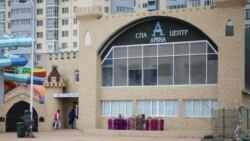The largest swimming pool in Russia’s Muslim-majority North Caucasus area has banned all women from using the pool.
Rights groups and others criticized the new policy, calling it discrimination.
The pool is part of a large sports and spa center near Makhachkala, capital of the Russian republic of Dagestan. The center announced its policy change Monday on the Instagram social media service. “From Jan. 20 onwards attendance of the pool is open only to men,” the message said.
Three women from Dagestan brought an official complaint to the local Prosecutor’s Office, Reuters news agency reported. The complaint states that the ban violates the constitution because it discriminates based on gender.
However, the operators of the pool said they made the decision for financial reasons. The center explained on Instagram that previously, women were permitted to visit the pool on Fridays for woman-only sessions. The Instagram messages were reported by Russia’s state-operated RIA news agency.
The center said that very few women came to visit on Fridays. Because of this lack of business, “the difficult decision was made that keeping days for women open in our pool was not viable,” the pool operators said on Instagram.
Fatima Abdulkhalimova is a 31-year-old former professional swimmer and a swim teacher at the pool. She questioned that reasoning. She noted that if having women-only days was not working financially, the pool could return to its earlier system. In the past, men and women could share the pool at the same time.
Abdulkhalimova added that she thinks the decision has something to do with religion. “I believe it is because a lot of religious guys come here,” she said.
In the North Caucasus, many people hold traditional social and religious beliefs. It is common for sports centers in the area to separate the days of use for men and women. But activists say a complete ban on women violates Russia’s constitution.
One of the women who brought an official complaint is Svetlana Anokhina. She is the editor of a locally-based internet website that addresses women’s rights issues. She told Reuters the practice of separating public spaces by gender was on the rise in the area.
“I have a daughter here and she has three daughters too. I’m angry because... I’m afraid for them. I don’t want them to live in a special ghetto for women,” Anokhina said.
Another woman who said she had often used the pool said she had been refused a membership pass last month. Commenting on Instagram, the woman wrote that the pool’s operators told her she couldn’t buy a pass because there was not enough locker room space for men.
I’m Bryan Lynn.
Reuters reported on this story. Bryan Lynn adapted the report for VOA Learning English. Kelly Jean Kelly was the editor.
We want to hear from you. Write to us in the Comments section, and visit our Facebook page.
_____________________________________________________________
Words in This Story
spa – n. a place where people go to improve their health by exercising or bathing in special water
complaint – n. a statement that something is wrong or unacceptable
viable – adj. effective and able to be successful
ghetto – n. an area of a city where people of a particular race or religion live, especially a poor area
locker – n. a small space in a public area where personal belongings can be kept






